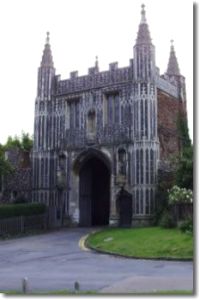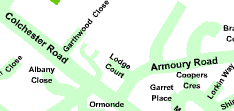 Armoury Road
Armoury Road
People who live in Armoury Road might quite understandably think that the name referred to a weapons store, perhaps sited originally at Armoury Farm. But they would be wrong. The name is, in fact, one of those corruptions that arise from words sounding like something else, or words being misheard and original meanings being lost.
One of the best-known examples of this is the district of South London known as the Elephant and Castle. The area took its name from the wife of Edward the First – Eleanor the Infanta of Castile, a mouthful that the Cockneys of the 12th century failed to get their tongues around.
Another is the pub near Victoria called “The Bag of Nails.” This is said to be a corruption of bacchanalia, the Roman festival that involved the consumption of large amounts of alcohol.
No weapons
Far from being associated with weapons, the “Armoury” estate on the edge of West Bergholt had a much more peaceful association.

Five hundred years ago the farm and the 240-acre estate that went with it belonged to St John’s Abbey in Colchester (see right). It was run by the Almoner, the priest responsible for handing out alms to the poor. So the produce – and the profits – from Almery Farm, as it was then known, were probably used for charitable purposes.
But King Henry VIII decided his need was greater than that of the poor and in 1539 he took over the Abbey and all its land in his nation-wide campaign to close the monasteries and use their funds for other purposes.
Corruption
Five years later, in a bit of straightforward, bare-faced corruption, the Almery estate was sold to one of the civil servants responsible for administering the land seized by the King. Richard Duke, Clerk to the Court of Augmentations, got the lot for £163 12s 8d.
There is evidence that Duke planned to sell the estate to the Sackville family who were Lords of the Manor of Bergholt Sackville – no doubt at a handsome profit.
It seems that North Essex was commuter territory even in Tudor times. Duke’s boss, the Receiver General of the Court of Augmentations, also received land in the county and was said to work from home.
Village Bulletin – Issue 85,
March 2001


 Armoury Road
Armoury Road